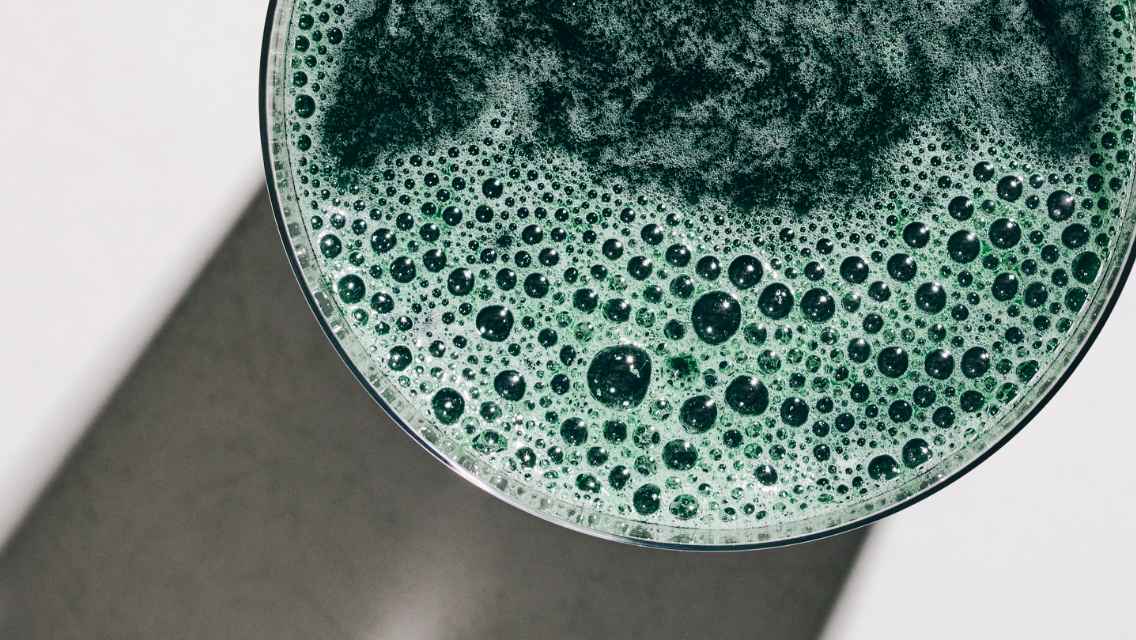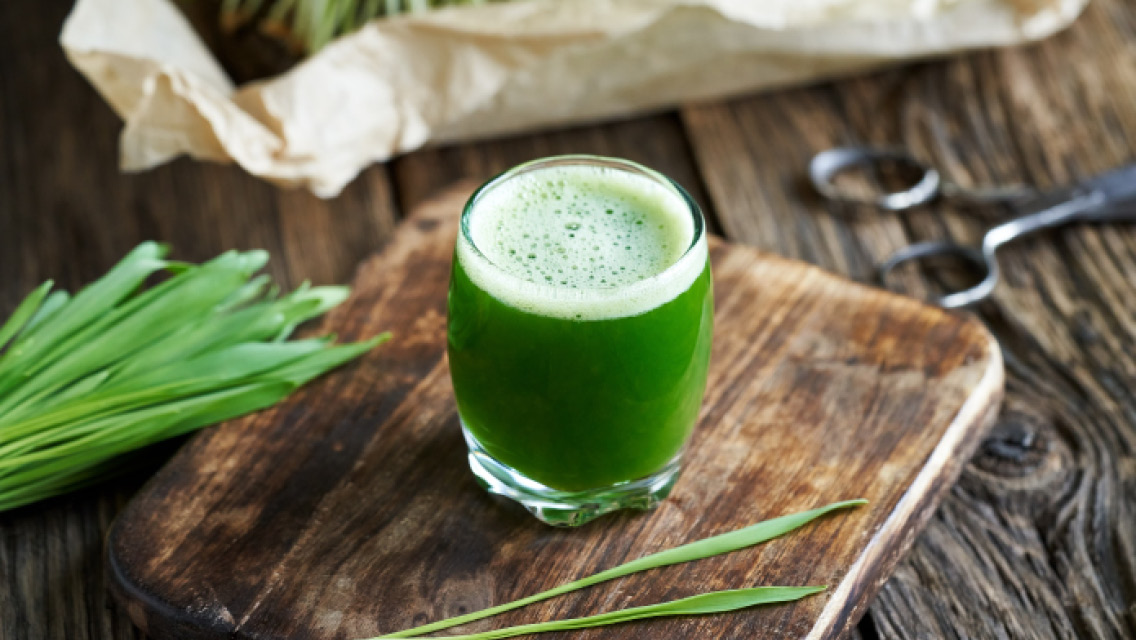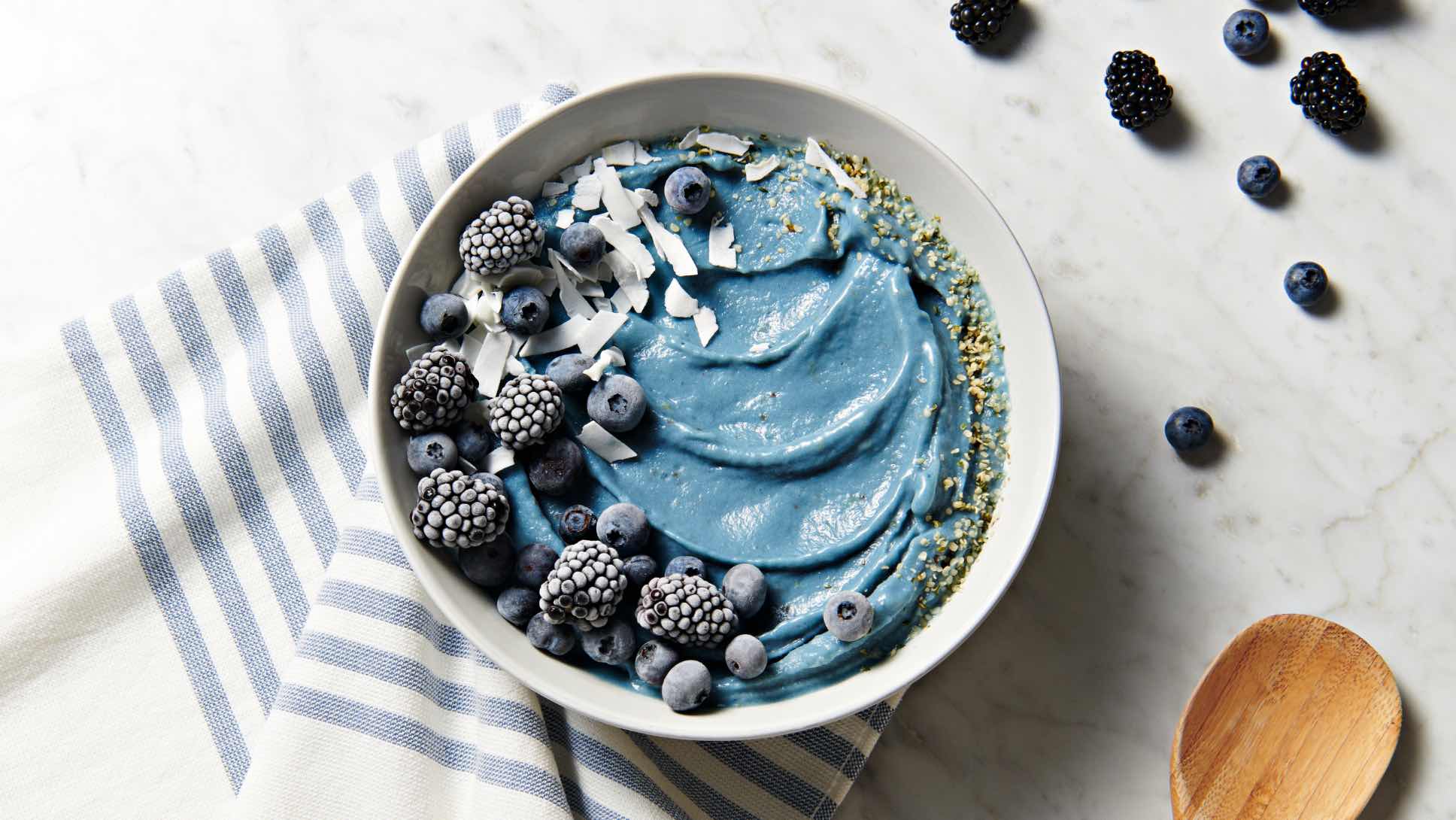Why Supplement With a Greens Powder?
With Anika Christ, RD
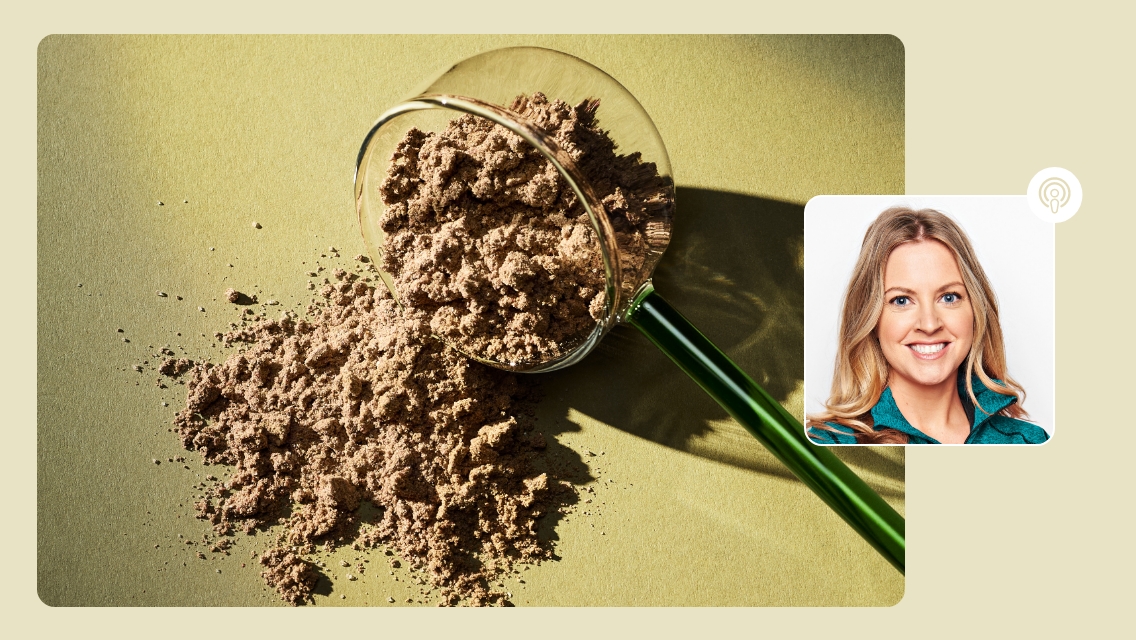
Season 8, Episode 7 | April 30, 2024
Most people don’t consume the enough produce daily — and even if they do, it’s often not from diverse sources, which is ideal for optimal health. A greens powder supplement is one straightforward way to up your intake of a variety of veggies and fruit. Anika Christ, RD, shares more about the benefits of this type of supplement, as well as what to look for in a quality greens powder.
Anika Christ, RD, CPT, is the senior director of nutrition and weight loss at Life Time. She’s known to many as “Coach Anika” and is one of the original virtual coaches who continues to lead a number of digital programs each year. She started at Life Time in 2008 and has spent her entire career helping build Life Time’s nutrition programs.
In this episode, Christ offers some key insights and information about greens powders, including the following:
- Christ champions eating a whole-foods diet as much as possible, but notes that a quality greens powder is a helpful tool for filling in any gaps we might have from not consuming enough produce or a diversity of vegetables and fruits.
- A quality greens powder should not only include greens, but other forms of plants as well, advises Christ. Life Time’s supplement, Life Greens, for example, is a blend of more than 40 different vegetables and fruits. Prebiotics and probiotics are also part of the Life Greens blend because of their gut-health benefits.
- Christ encourages looking for the inclusion of spirulina in any greens powder you might consider; it’s the first ingredient in the Life Greens ingredients list because of its nutritional power.
- In addition to prioritizing produce at every meal, Christ says most people can benefit from supplementing with a greens powder one to two times daily.
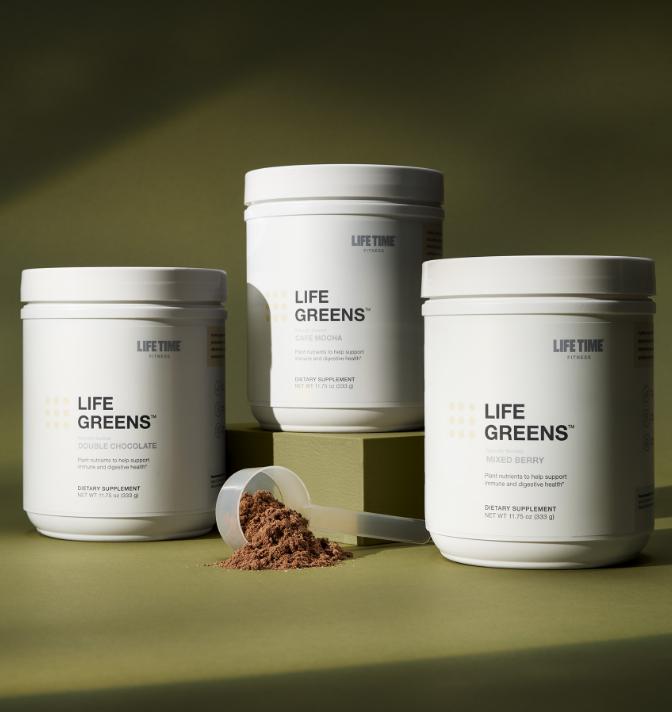
Greens That Taste Good
Life Greens helps nourish and revitalize with more than 50 different fruits and vegetables, plus antioxidants, digestive support, and probiotics in every scoop. Always naturally flavored, naturally sweetened, and tested for purity. Available in three delicious flavors.
Also Explore:
Shop All Nutritional Supplements
ADVERTISEMENT
More Like This
Should You Use a Greens Supplement?
Learn why a greens powder may be a worth it way to boost your veggie intake — and what to look for when selecting one.
What Are Supergreens and How to Incorporate More into Your Diet
Once a niche market for health fanatics, supergreens have gained a wider audience. Here’s what they are, how to get them and what they can do for you.
Summer Skies Smoothie Bowl
Discover the health benefits of blue spirulina and how to make this decadent yet healthy breakfast (or snack!) at home.
Transcript: Why Supplement With a Greens Powder?
Season 8, Episode 7 | April 30, 2024
[MUSIC]
Welcome to Life Time Talks, the podcast that’s aimed at helping you achieve your health, fitness, and life goals. I’m Jamie Martin, editor-in-chief of Experience Life, Life Time’s whole life health and fitness magazine. And I’m David Freeman, director of Alpha, one of Life Time’s signature group training programs.
We’re all in different places along our health and fitness journey, but no matter what we’re working toward, there are some essential things we can do to keep moving in the direction of a healthy purpose-driven life.
In each episode, we break down various elements of healthy living, including fitness and nutrition, mindset and community, and health issues. We’ll also share real, inspiring stories of transformation.
And we’ll be talking to experts from Life Time and beyond who share their insights and knowledge so you’ll have the tools and information you need to take charge of your next steps. Here we go.
[MUSIC]
Hey everyone, welcome to a mini episode of Life Time Talks. In this one, we are talking about greens powders, what they are and why they can contribute to good health. So with that, we’re bringing back one of our go-to experts from Life Time. We have Anika Christ with us. She is a registered dietitian, personal trainer and the senior director of nutrition and weight loss at Life Time. She’s known to many as Coach Anika and as one of the original virtual coaches who continues to lead a variety of digital programs each year.
She started at Life Time in 2008 and has spent her entire career helping build Life Time’s nutrition programs. Anika, welcome back.
Thank you for having me.
Hello, hello.
Hey, so we’re in a mini episode, so we’re going to get right down into it. What is greens powder and why should somebody be using it, Anika?
So what I love about greens powder, and we’ve been so lucky at Life Time, we’ve had one for almost 15 years. And so over time, we’ve made it better and better and improving, but why I will recommend a greens powder to most people — and you guys know my approach with food, I want people on as close to a real food diet as often as possible. But the reality is most of us are not getting a diverse amount of fruits or vegetables in every day. And I always love to look at the stats because there’s really great stats on just America in general. And our top produce, it’s always the same things: It’s wheat, it’s corn — tomatoes and potatoes are like kind of our top two, like crops that most of us actually consume on a regular basis. And a lot of times people will say, Oh, like French fries, ketchup and French fries. I’m like, yeah, maybe, right? When we look at kind of mass production of what we’ve kind of done to those certain crops.
But the reality is even when I work with clients and they’re intentionally making really good food choices and really focused on their macronutrients and stuff, they’re kind of picking the same six to eight crops every day on their grocery bill. And there’s science behind that, right? Like I want to be methodical. I want to stick to whatever meal program I’m trying to have for myself. And I would say that too, as a dietitian, I don’t want you throwing away produce every week that you’re not eating, but I want you exposed to more produce and more recipes. But greens make it really easy. It’s never going to replace what plants and a produce, a high produce diet can, but it can make it more convenient and it can be used strategically at your advantage because it’s really good at providing a really small amount, but a huge impact of when you’re looking at diverse fruits and vegetables.
And the best ones out there usually aren’t just greens, they’re plants, it’s produce, and there’s berries maybe added to it and other fruits that are really high in antioxidants. So I say, why not? It’s a nice way just to add a great supplement to your routine. But again, it’s kind of taking a look in the mirror, like how good am I at really getting plants and a variety of plants in every single day?
Well, when you think about that, Anika, you think about some of the recommendations that there are around how much produce to get in a day, right? Some people will say like, eat enough produce, it’s like the size of your head, like that would equivalent the size of your head. Or, you know, functional medicine experts often say, eat nine cups of veggies a day. You know, so thinking about how to do that, that can be really hard for a lot of people. So if there’s a way to supplement that with, you know, with a powder that can help balance that, you get some of that from real food, some of that from a powder. That seems like a great way to start. But I mean, but when you think about it, like when we often hear the recommendation, eat the rainbow, our our greens powders, like are they considering the full rainbow in the powders typically? And with the Life Time one in particular?
Yeah, it’s a great one. I say, you know, we have one called Life Greens and we do consider that — and a lot of times that’s where this is what’s hard of that category, we call ours greens because it’s easy to recognize and people understand pretty quickly, like, oh, that’s supplementing, but it’s not just greens. There should be 30 plus different plants in it that accounts for that rainbow, literally. And a lot of them out there don’t. And a lot of people don’t understand that. So they’re like, well, there’s only a couple of ingredients in this one. And I’m like, well, that means it’s just less variety of a plant population. And ours, we start with spirulina, which is a very high quality, healthy plant that I would say. The best ones out there, you’ll see that at the top, like the number one ingredient in there. But the reality is a lot of them don’t. So it might be very specific. It might be a couple different plants, but that’s a great call that there’s a lot of varying recommendations out there when it comes to plants too.
And gosh, if you talk to people that do a very high protein diet or maybe a carnivore style diet, a lot of them aren’t getting any plants. So the right thing I would think for most people is we do need variety. We know that when it comes to our gut health and the flora, that’s what prebiotics are really great for, like fiber. But making sure that we have plants for our bacteria and our body are healthy. Bacteria to feed on is protocol for health. So we all know that. The science shows that. So I’m really good at, hey, for clients, I try to say a few servings at each meal if possible and greens. So if you’re not doing that, one to two servings of greens would be very advantageous for you when it comes to your health for sure.
OK, so you just kind of said the answer to the question I was going to say then. So you’re saying from a supplementation standpoint with greens, would you say the recommendation would be at every meal? So is that about three, four times throughout the day? Is that your recommendation when taking in greens?
For the supplement, I would say one to two servings. For plants, eating plants, every meal. Most people, and kind of like Jamie was saying, some people say two size headfuls — some say five servings a day. There’s a lot of campaigning done. I remember as a child, it was all about the five a day program. That was a big thing. People are still not doing it though. So people know that’s the other thing too. People know. And that’s, I guess in my field, I’m doing less educating on what’s important. Cause people are like, I know what’s healthy, but we’re not doing it. So how do we make it more convenient? And a lot of that is exposure too, especially with plants, you know, that’s where I think when we look at our population and it’s very limited on like corn, wheat, tomatoes, a lot of people just haven’t tried stuff either, right? So like that, I love that. I love getting people on a real food diet as much as possible, but I know the reality of the beast too. So I like supplements for that as it’s supposed to supplement a healthy diet, not be the whole thing.
But if you’re, I have clients that start with me that do zero plants a day. So I might start them on three servings and then wean them down once they get really good and confident with their eating of certain plants for sure.
Do you think there’s any individuals who probably should not be taking in life greens or that there might be not be an ideal candidate for this or is this fit everyone?
You know, I think it fits everyone, especially in a state where one thing we’re not talking about yet is just like the antioxidant load. So again, like we’re all exposed to free radicals. Our bodies are meant to create free radicals. That’s kind of part of being a human being. But reality is a lot of us, that’s why you want to eat plants, right? It’s the prebiotics. There are other certain compounds in there, but antioxidants for sure, like the number one. So for me, I would say I can’t think of a reason why someone wouldn’t.
Although if they have a high plant diet and they’d be like, hey, I’m filling the gap on all this. I’m eating in season, right? That’s a big part of plants too, when they’re the most nutritious and local. Um, that’s hard in Minnesota where I’m at, I know that so much, like I can’t eat like that all year. So I think the reality is most people are going to benefit for sure. Now, if you feel really great with your nutrition and you’re getting in elsewhere and you need to put your supplement budget on things that you’re not getting in every day. I understand that too, but I think it’s a really easy way. We formulated ours to make it super easy to add to a protein shake because the reality is if you’re already drinking a protein shake, which a lot of our customers do, it’s a great way to add antioxidants. It’s a great way to add nutrition without doing anything different. It’s kind of habit stacking. But you can drink it with water. You could add it to Greek yogurt. There’s so many other ways you could add it in and I think what I love about ours is a lot of the greens out there are more of just like a multivitamin, which is fine. But when we have other things such as probiotics added to ours, prebiotics, antioxidants, there’s so many other value props with it that it’s really good to support kind of full body metabolism. So it’s not only supplementing the plants that we should be eating in our diet, but it’s supporting our gut health, which I would tell you as a dietitian, over half the people I see usually have some sort of gut issue too. So most people I see are saying, yes, absolutely.
So you are alluding to kind of the quality of the Life Greens program that Life Time has. What are things that people should look for on a label around greens to make sure that they’re getting a high quality green? You already mentioned like the breadth of, you know, the amount of produce or whatever that’s in it, but what else?
Yeah. And then we also talked about spirulina. So I would say spirulina is a top ingredient for sure. Like hands down, there’s so many benefits to it. It helps with blood sugar control too. It helps with seasonal allergies. It can increase your energy and support muscle breakdown. So I’m always like the amount of research on that ingredient alone would be like what I would look for. We use freeze dried too. And there’s a component of that that actually the way that it’s manufactured, it makes it more absorbing.
So I always say like, it’s not just what you eat, it’s what we digest and absorb. You guys say that all the time on the show, which I love. But I think in that aspect too, that makes it a little bit higher quality because it’s plants. You know, I think it’s fair to say non-GMO as much as possible, especially for ingredients. So that’s of concern. Our life greens are non-GMO for all of our ingredients as well. And then I would say like a plethora of plants that you’re talking about, like look for berries and veggies because just like the color of the rainbow that you were talking about at the beginning, different colors have different plant compounds and have different health benefits tied to them. So I do think that’s super important. And I think, again, we would call our something different, but greens is just so recognized in the category. But it’s not just replacing spinach and artichokes and your green plants, per se. It should be a plethora of different things. I also think in that category, because they can do it, like adding enzymes that help break down in your body so that, when you’re drinking your greens, you’ve got other activity to help support digestion as well as probiotics and probiotics, honestly. And it can be done. That’s what’s so cool about that category is it’s just evolved so much even in the last five years. But the reality is that they’re really strong. It supports plants, but it supports digestion and gut health too. That’s why I love it.
Let’s stay right there. When you said like gut health and potentially like the repairing of the gut, what exactly is taking place for those who are listening because they hear gut health and how it can support the repairing. So what exactly is taking place? I’m not saying necessarily only for the greens, but when you say gut health and repairing of the gut, what’s exactly taking place in that process?
Yeah. So when you talked about gut health, I mean, that’s everywhere from the saliva that you carry all the way down to all your digestive organs. So a lot of times people think clearly digestion. Am I bloated after meals? Do I have regular bowel movements? How do I feel on a regular basis? There’s also very many common symptoms when gut health is off that have to do with skin, breathing, do you get congested? Do you have seasonal allergies every year? That’s all kind of tied to what your body’s experiencing when we say gut health, but your gut is made up of microflora and a microbiome, and there’s several different versions of it. But that’s the easiest way that I would explain is we’re all kind of bacteria. It’s kind of funny, like the most thing in our body is actually bacteria and it should be healthy bacteria. And obviously we have unhealthy bacteria, which they call dysbiosis of the gut. But the reality is you have to feed your gut because that flora needs to feed on stuff to make it healthy and make it diverse. So sometimes we get in the category of probiotics, people will wonder, well, what’s the right strain? And it’s like, the answer is none. The answer is many strains. You want diversity because that’s how the body is supposed to evolve and maintain itself. But greens or prebiotics are what your probiotics or your bacteria in your body actually feed on. So you’re feeding that as well. So it’s not like — food is so cool. So it’s not just like what makes me full. It’s like, what’s my body utilizing when it comes to energy and nutrients. But we would look at that as this, what we’re really poor at and the American diet is fiber as well. Right. And fiber comes from plants. And so greens can substitute that. So you can feed your flora, really great stuff. And if you have healthy flora, you’re going to have great skin, you’re going to have great digestion. You’re not going to experience those symptoms I kind of rattled off. And the reality is your immune system lives there too. 70%, it’s been estimated up to 90% now. I don’t know what the exact number is, but that’s how you like just function and feel on a regular basis. And that’s why the seasonal allergies perks some of our ears up. So like, oh, I get seasonal allergies. And the reality is what you eat, it’s all about not just what you’re eating, but what you digest and absorb of what you’re eating. So prebiotics are essential. And that’s kind of in the last five years too. It’s always been about probiotics. And that’s true. You need to replace the bacteria, especially if you go on an antibiotic, you want to replenish, but you need to feed it. And that’s what prebiotics do. That’s what fiber does. And that’s what life greens does. So the more diverse plants in there, the better.
Anika, this is why we love having you come on. I mean, you’re just like, one, your knowledge about this, but then also your enthusiasm. Like you just said, food is cool. And it’s so, it is so cool. Like how it supports our bodies. So before, because this is a mini episode, anything else we missed about life greens or greens in general that you would want to make sure our listeners know or did we get it all?
I think you got it all. And I think when the only thing I would add on is when you said, is anybody shouldn’t and we were saying. Most people should. That goes for kids too. And again, if that’s helpful for our listeners, if you’ve got little listeners at home, that’s something I add into my kids’ diet too, because yes, I want them exposed. They eat a ton of fruits and vegetables, but they’re not perfect. Kids aren’t perfect either. So it’s just a really great thing to have in your supplement cabinet or your pantry for a regular basis to optimize whatever you’re putting in front of them for food.
So this was great.
Awesome.
Well, if people want to follow you, they can find you @coachanika on Instagram and in other locations. You obviously are running different programs at Life Time all the time. Those are virtual and digital programs in many cases. So in the Life Time app, you have articles at experiencelife.lifetime.life. We’ll link to a bunch of those pieces. And obviously you’ve been on the podcast. So we will point back to previous episodes as well. Anika, thank you as always for joining us.
Awesome. Thanks for having me.
[MUSIC]
Thanks for joining us for this episode. As always, we’d love to hear your thoughts on our conversation today and how you approach this aspect of healthy living in your own life. What works for you? Where do you run into challenges? Where do you need help? And if you have topics for future episodes, you can share those with us too. Email us at lttalks@lt.life or reach out to us on Instagram @lifetime.life, @jamiemartinel and @freezy30 and use the hashtag #LifeTimeTalks.
You can also learn more about the podcast at experiencelife.lifetime.life/podcast. And if you’re enjoying Life Time Talks, please subscribe on Apple Podcasts, Spotify, Google Podcasts, or wherever you listen to podcasts. If you like what you’re hearing, we invite you to rate and review the podcast and share it on your social channels too.
Thanks for listening. We’ll talk to you next time on Life Time Talks.
Life Time Talks is a production of Life Time Healthy Way of Life.
It is produced by Molly Kopischke and Sarah Ellingsworth with audio engineering by Peter Perkins, video production and editing by Kevin Dixon, sound and video consulting by Coy Larson, and support from George Norman and the rest of the team at Life Time Motion. A big thank you to everyone who helps create each episode and provides feedback.
[MUSIC]
We’d Love to Hear From You
Have thoughts you’d like to share or topic ideas for future episodes? Email us at lttalks@lt.life.
The information in this podcast is intended to provide broad understanding and knowledge of healthcare topics. This information is for educational purposes only and should not be considered complete and should not be used in place of advice from your physician or healthcare provider. We recommend you consult your physician or healthcare professional before beginning or altering your personal exercise, diet or supplementation program.



